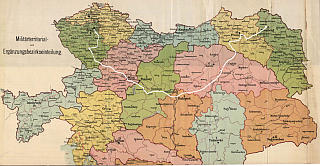
Švejk's journey on a of Austria-Hungary from 1914, showing the military districts of k.u.k. Heer. The entire plot of The Good Soldier Švejk is set on the territory of the former Dual Monarchy.
The Fateful Adventures of the Good Soldier Švejk (mostly known as The Good Soldier Švejk) by Jaroslav Hašek is a novel that contains a wealth of geographical references - either directly through the plot, in dialogues or in the author's narrative. Hašek was himself unusually well travelled and had a photographic memory of geographical (and other) details. It is evident that he put a lot of emphasis on geography: Eight of the 27 chapter headlines in the novel contain geographical names.
This web site will in due course contain a full overview of all the geographical references in the novel; from Prague in the introduction to Klimontów in the unfinished Part Four. Continents, states (also defunct), cities, market squares, city gates, regions, districts, towns, villages, mountains, mountain passes, oceans, lakes, rivers, caves, channels, islands, streets, parks and bridges are included.
The list is sorted according to the order in which the names appear in the novel. The chapter headlines are from Zenny Sadlon's recent translation (1999-2024) and will in most cases differ from Cecil Parrott's translation from 1973.
The quotes in Czech are copied from the on-line version of The Good Soldier Švejk: provided by Jaroslav Šerák and contain links to the relevant chapter. The toolbar has links for direct access to Wikipedia, Google maps, Google search, svejkmuseum.cz and the novel on-line.
The names are coloured according to their role in the novel, illustrated by these examples: Sanok a location where the plot takes place, Dubno mentioned in the narrative, Zagreb part of a dialogue, and Pakoměřice mentioned in an anecdote.
 Places index of countries, cities, villages, mountains, rivers, bridges ... (592)
Show all
Places index of countries, cities, villages, mountains, rivers, bridges ... (592)
Show all I. In the rear
I. In the rear  14. Švejk as military servant to senior lieutenant Lukáš (60)
14. Švejk as military servant to senior lieutenant Lukáš (60) II. At the front
II. At the front  2. Švejk's budějovická anabasis (64)
2. Švejk's budějovická anabasis (64) 3. Švejk's happenings in Királyhida (43)
3. Švejk's happenings in Királyhida (43) III. The famous thrashing
III. The famous thrashing  1. Across Magyaria (38)
1. Across Magyaria (38) 2. In Budapest (38)
2. In Budapest (38) 3. From Hatvan to the borders of Galicia (50)
3. From Hatvan to the borders of Galicia (50) 4. Forward March! (42)
4. Forward March! (42)



|
III. The famous thrashing |
 | |
4. Forward March! | |||
 | Sanok |  | ||||
| ||||||
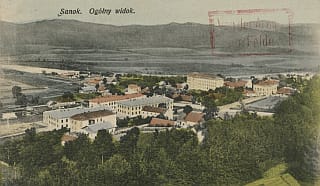
Sanok, 1916

,1904
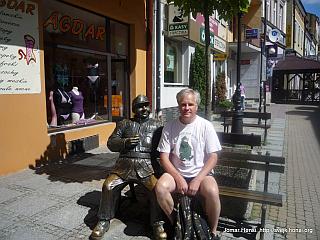
Ławeczka Józefa Szwejka w Sanoku, Ulica 3 maja. 2010.
Sanok is mentioned 15 times in The Good Soldier Švejk.
Sanok witnesses a short but eventful stay. It was the intention that the march battalion were to wait here for a few days before continuing to the front on foot, but they arrived two days early so were ordered to continue the same evening due to lack of accommodation. In the meantime they have to endure a speech by the brigade commander.
The most spectacular episode involves Leutnant Dub who is going to check that the soldiers don't visit whorehouses but lets himself get lured into debauchery by Miss Ella. Švejk in the end drags him out of the brothel to make sure he is joining battalion's the journey onwards.
Several institutions in Sanok are mentioned in The Good Soldier Švejk: Gimnazjum where the march battalion were to be quartered, Bank Krakowski where brigade staff was located and Kawiarnia Miejska, the brothel that Leutnant Dub had to be pulled out of.
Background
Sanok is a city in the Podkarpackie region of Poland, an important railway junction by the river San. It was part of Austria until 1918, and the city had until 1947 a large Ukrainian population.
Information about and pictures of places in Sanok that are mentioned in The Good Soldier Švejk can be found in Josef Schwarz's thorough travel letter from a trip in the footsteps of Švejk in Galicia, published in the Ikaros magazine in 2006[a].
Statue of Švejk
In the pedestrian street Ulica 3 maja was in 2003 unvailed a statue of Švejk, called Ławeczka Józefa Szwejka because the soldier is sitting on a bench. This is the second oldest statue of Švejk in the world (the first appeared in Humenné in October 2000).
Licensia poetica
It is improbable that Jaroslav Hašek or his XII. Marschbataillon ever visited Sanok so the way the city is presented in The Good Soldier Švejk ought ot be taken with a pinch of salt. That said, his experiences from other places in Galicia may have been pulled into the plot at this point.
The reader is informed that Sanok is located 150 km behind the front, which indicates that we are at the beginning of July 1915. This fits poorly with the plot of The Good Soldier Švejk where Švejk's march battalion arrived in Budapest on 23 May and thus would have spent 5 weeks on the train to Sanok! This is one example of how little emphasis Hašek put on aligning the timeline of the plot with historical events. Here he appears to have jumped ahead in time to his own journey that started from Királyhida on 30 June 1915.
That any brigade staff connected to Infanterieregiment Nr. 91 would have resided in Sanok at this time is impossible. Documents from Kriegsarchiv in Vienna shows that 18th march brigade HQ was located by Sambor at the beginning of July. It must therefore be assumed that the inspiration for this chapter is taken from XII. Marschbataillon's journey from Sambor to Gołogóry between the 5th and the 11th or from some march that Hašek took part in after having reached the front.
Nor is there any account of Hašek's XII. Marschbataillon ever having been in Sanok and the town was not even located on the route to the front. Nearby Zagórsk is however on the route so the march battallion must necessarily have travelled past it. This would probably have happened on 3 July 1915 because Jan Vaněk informs that the battalion waited in Humenné the day before and by Sambor the day after[b].
Yellow posters
Along parts of Švejk's itinerary in Galicia laminatet yellow posters describe the place in question along with quotes from the novel. At Sanok railway station informs that Švejk's battalion arrived here on 15 July 1915. Seen in relation to the information above this date is picked from thin air. Precisely at this date Jaroslav Hašek had already spent 4 days at the front by the river Bug and his XII. Marschbataillon had already been dissolved!
Quote(s) from the novel
[III.4] Objevilo se, když se přijelo do Sanoku, že vlastně na tom voze s polní kuchyní jedenáctky, kde prděl blahem nasycený Baloun, měli celkem pravdu, že bude večeře, a dokonce kromě večeře že tam bude rozdáván nějaký komisárek za všechny ty dny, kdy nedostal batalion ničeho.
Also written:Сянiкua
Literature
- Słownik geograficzny Królestwa Polskiego..., ,1880 - 1914
- Po Švejkových (a Haškových) stopách v Haliči, Josef Schwarz,2006 [a]
- Válečný deník Jana Vaňka, ,2014 [b]
| a | Po Švejkových (a Haškových) stopách v Haliči | Josef Schwarz | 2006 |
| b | Válečný deník Jana Vaňka | 2014 |
 | Mosty Wielkie |  | |||
| |||||
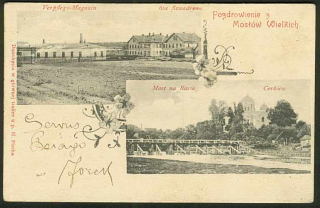
Mosty Wielkie is mentioned by the author as he explain the situation at the front when the march bataillion arrives in Sanok. The railway line northwards from Sanok to here was undamaged it's said.
Note that Cecil Parrott's translation uses Mościska (now Мостиська), which is actually another town.
Background
Mosty Wielkie is the Polish name of Великі Мости (Velyki Mosty), a town in Galicia, now in the Sokal region of Ukraine. Jaroslav Hašek and his Infanterieregiment Nr. 91 marched past here 21 July 1915, on the way to Sokal. The town had a garrison from 1846 to 1918. The mentioned railway line didn't exist, so the author probably had another place in mind.
Quote(s) from the novel
[III.4] Ačkoliv odtud bylo spojení železniční neporušeno pod Lvov i severně na Veliké Mosty, bylo vlastně záhadou, proč štáb východního úseku udělal tyto disposice, aby „železná brigáda“ se svým štábem soustřeďovala pochodové prapory sto padesát kilometrů v týlu, když šla v té době fronta od Brodů na Bug a podél řeky severně k Sokalu.
Also written:Veliké MostyHašekВеликі Мостиua
Literature
- Słownik geograficzny Królestwa Polskiego..., ,1880 - 1914
 | Brody |  | |||
| |||||
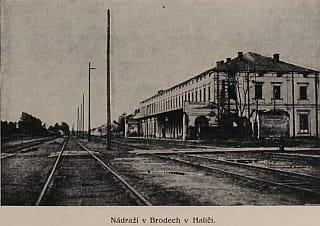
,1925
Brody is mentioned by the author as he explains the situation at the front when Švejk's march battalion arrives in Sanok. The front stretched from Brody to Bug.
Background
Brody (ukr. Броди) is a city in Galicia, now in the Lviv oblast of Ukraine. Before World War I it was an important trading city on the border between Russia and Austria-Hungary. In 1914 Jews made up more than 60 per cent of the population.
Russian forces conquered the city in late August 1914, and it was recaptured 2 September 1915 [a]. The following year it was captured again during the Brusilov offensive and remained occupied until 1918.
Literary time lapse
That the front has been even near Brody in late May 1915 when Švejk presumably was in Sanok doesn't correspond to historical facts. Note that from Budapest to Sanok there is a gap of five weeks between Švejk and the author's own journey.
Quote(s) from the novel
[III.4] Ačkoliv odtud bylo spojení železniční neporušeno pod Lvov i severně na Veliké Mosty, bylo vlastně záhadou, proč štáb východního úseku udělal tyto disposice, aby „železná brigáda“ se svým štábem soustřeďovala pochodové prapory sto padesát kilometrů v týlu, když šla v té době fronta od Brodů na Bug a podél řeky severně k Sokalu.
Also written:Бродиua
Literature
- Słownik geograficzny Królestwa Polskiego..., ,1880 - 1914
- Ermolli in Brody eingerückt, ,2.9.1915 [a]
| a | Ermolli in Brody eingerückt | 2.9.1915 |
 | Limanowa |  | |||
| |||||

Schlachtfeld von Limanowa, wo die Russen eine empfindliche Niederlage erlitten haben.
Unsere krieger, ,1917
Limanowa is mentioned by Hauptmann Tayrle when he emphasizes for Hauptmann Ságner who hopeless reserve officers generally are. He illustrates his point by mentioning that when they withdrew from Limanova and Kraśnik the reserve lieutenants lost their heads as soon as they saw a Cossack patrol.
Background
Limanowa is a town in western Galicia, known for the battle in December 1914 where Austria-Hungary succeeded in repelling a Russian offensive that threatened Kraków. This was the Dual Monarchy's first strategic victory in the war and saved it from immediate collapse.
From Hauptmann Tayrle's uttering it is easy to assume that Austria-Hungary lost the battle. This is however not correct (as mentioned above).
Quote(s) from the novel
[III.4] Když jsme ustupovali od Limanova a od Krasníku, všichni ti ,takélajtnanti’ ztratili hlavu, jakmile uviděli kozáckou patrolu. My, ve štábu, nemáme rádi takových příživníků.
Also written:LimanovHašek
Literature
- Bitva u Limanově,
- Słownik geograficzny Królestwa Polskiego..., ,1880 - 1914
 | Kraśnik |  | |||
| |||||
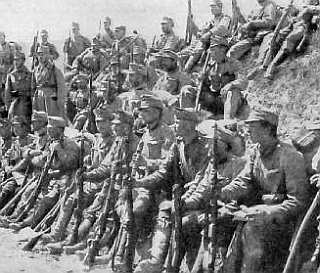
Kraśnik is mentioned by Hauptmann Tayrle when he in Sanok points out for Hauptmann Ságner how clueless reserve officers generally are.
Background
Kraśnik is a town in that belonged to the Russian part of Poland. It is known for the battle that took place from 23 to 26 August 1914, the first major battle in the war that Austria-Hungary won. The Austrian commander General Dankl was awarded the honorary title Dankl Graf von Krasnik after this battle. On the Russian side the famous-to-be Finnish commander Carl Gustaf Mannerheim participated.
Quote(s) from the novel
[III.4] Když jsme ustupovali od Limanova a od Krasníku, všichni ti ,takélajtnanti’ ztratili hlavu, jakmile uviděli kozáckou patrolu. My, ve štábu, nemáme rádi takových příživníků.
Also written:KrasníkHašek
Literature
- Słownik geograficzny Królestwa Polskiego..., ,1880 - 1914
 | Hanover |  | |||
| |||||
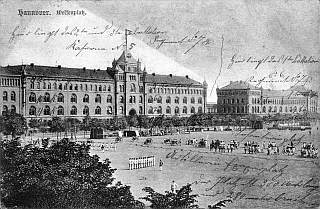
Welfenplatz 1898, the seat of the Hanover garrison.
Hanover is mentioned because the reserves of a Hanover Division claimed the quarters which the march battalion IR. 91 were supposed to use. Their commander had such an ugly gaze that the commander of the Iron Brigade lost his nerve.
Background
Hanover is a large city in Northern Germany, in 1914 capital of the Prussian province of Hanover. The division mentioned in the novel took its name from the province, not the city.
In the German Empire there were two so-called Hanover-divisions, numbered 19 and 20 respectively. These belonged to Armeekorps X, which was also based in Hanover. Both divisions operated in Galica during the time-span of this part of the plot (early July 1915). It is therefore likely that their reserve units passed Sanok on the way to the front.
Quote(s) from the novel
[III.4] Totéž bylo i při frontových úsecích, které byly ještě dále v týlu, jako zde v Sanoku, kam najednou přibyly reservy německé hanoverské divise pod vedením plukovníka s tak ošklivým pohledem, že brigadýr byl uveden do naprostého zmatku.
Credit: Österreich-Ungarns letzter Krieg
Also written:HannoverczHannoverde
 | Platnéřská ulice |  | |||
| |||||
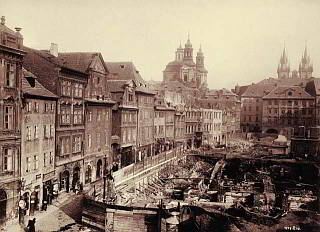
Platnéřská ulice is mentioned by Švejk when he talks and forces his way into the whorehouse in Sanok to pick up Leutnant Dub. Madam is politely reminded through the anecdote about Vondráček and madam Křovánová how she might end up if she makes too much noise.
The street appears again in [IV.2] in connection with the anecdote about Růžena Gaudrsová, who had been employed in a vinárna there.
Background
Platnéřská ulice is a street in Staré město, Prague. It was renovated around 1908 and changed character completely.
In 1910 there were two wine taverns in the street: Antonín Kafka's in no. 9 and František Müller's in no. 15.
Quote(s) from the novel
[III.4] „Moc na mě neřvete, milostpaní,“ řekl vlídně Švejk, usmívaje se přitom sladce, „nebo vám dám přes držku. U nás jednou v Platnéřské ulici zmlátili jednu madam tak, že nevěděla o sobě. To tam syn hledal svýho otce, nějakýho Vondráčka, obchod s pneumatikama. Vona se ta madam jmenovala Křovánová, když ji vzkřísili a ptali se jí na záchrannej stanici, jak se jmenuje, řekla, že nějak vod ,Ch’. A jaké je vaše ctěné jméno?“
Credit: Jaroslav Šerák
 | Morocco |  | |||
| |||||
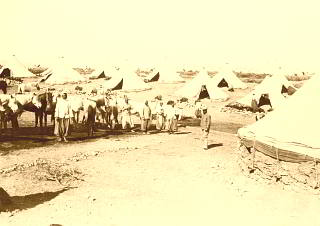
France waged war in Morocco from 1906 to 1912
Morocco is mentioned by tinsmith Pokorný from the anecdote about the man who answered questions totally off topic. Once the sultan of Morocco had been the theme.
Background
Morocco is a country in North Africa, in 1914 a Spanish and French protectorate, which previously had been governed by the Ottoman Empire. There were repeated conflicts between France and Germany about Morocco, and in 1905 and 1912 treaties were signed that recognised the special position of France and Spain. Many Moroccans served in the French armed forces during World War I. The sultan in question is surely Yusef ben Hassan who came to power in 1912 after the treaty of Fez.
Quote(s) from the novel
[III.4] Nebo se ho zeptali: ,Jed jste už letos hříbky?’ a von na to vodpověděl: ,Nejed, ale tenhle novej sultán marockej má prej bejt moc hodnej člověk.“
Also written:Al-MaghribarMarokoczMarokkodeMarruecosesMarocfr
 | Velké Meziříčí |  | |||
| |||||
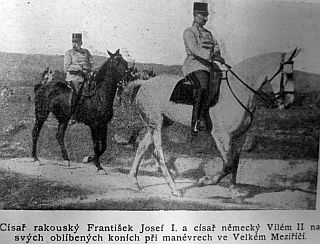
,1.10.1909
Velké Meziříčí is mentioned by Švejk when talking with Rechnungsfeldwebel Vaněk during the march from Sanok to Tyrawa Wołoska. He had participated in manoeuvres there.
Background
Velké Meziříčí is a town in the Vysočina region of Czechia. It is located in the Moravian part of the region, east of Jihlava in the direction of Brno.
There is no doubt that Švejk refers to Kaisermanövern Imperial manoeuvres there in 1909[a], an event that even Svět zvířat mentioned during the period Hašek edited the magazine[a]. Even a photo showing Emperor Franz Joseph I. and Emperor Wilhelm II. on horseback was printed. The manoeuvres took place from 8 to 11 September 1909.
Quote(s) from the novel
[III.4] Švejk táhl se vzadu se štábem kumpanie, se sanitou a nadporučík Lukáš objížděl celou kolonu, přičemž každou chvíli zajel dozadu, aby se přesvědčil u sanity, kde na vozíku pod plachtami vezli poručíka Duba k novým hrdinným činům do neznámé budoucnosti, a přitom aby také si ukrátil cestu rozmluvou se Švejkem, který nesl svůj baťoch a ručnici trpělivě, vyprávěje si s účetním šikovatelem Vaňkem o tom, jak se to před lety pěkně mašírovalo na manévrech u Velkého Meziříčí.
Also written:Groß Meseritschde
Literature
- Historie, [a]
- Letošní velké císařské manévry, ,1.10.1909
| a | Historie |
 | Starý Knín |  | |||
| |||||

Starý Knín was where Švejk met Karla Veklová at a dance when he was serving in the army, seemingly during an army exercise. Unfortunately it soon became obvious that the lady didn't like him that much.
Background
Starý Knín is a village in the Příbram district south-west of Prague. The village was in 1960 joined with Nový Knín.
Quote(s) from the novel
[III.4] Když jsme před lety stáli lágrem v Mníšku, tak jsem chodil tancovat do Starýho Knína, namluvil jsem si tam nějakou Karlu Veklovou, ale moc jsem se jí nelíbil. Jednou večer v neděli jsem ji doprovázel k rybníčku, tam jsme si sedli na hráz a ptal jsem se jí, když zapadalo slunce, jestli mě má taky ráda.
 | Tyrawa Wołoska |  | ||||
| ||||||
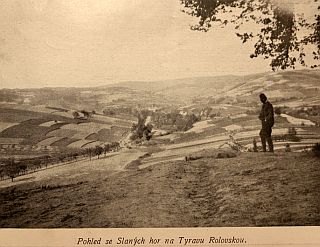
,16.7.1915
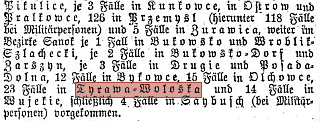
,4.11.1914
Tyrawa Wołoska is mentioned 12 times in The Good Soldier Švejk.
Tyrawa Wołoska was the first stop on the march from Sanok. The brigade were meant to stay overnight here but were ordered to march on towards Liskowiec. The stay here was little more than a break, were the soldiers tasted the bad water of the village in which they had to add citric acid for protection against cholera. Leutnant Dub was now slowly recovering from his calamity in Sanok.
Background
Tyrawa Wołoska is a large village in Galicia, 17 km east of Sanok. The village was in 1914 part of Austria-Hungary and mainly inhabited by Ruthenians (Ukrainians). Tyrawa Wołoska has belonged to Poland since 1918.
Already in November 1914 there were reported cases of cholera in the village, so the description in the novel about boarded up wells is realistic. This still doesn't prove that author knew the place, this chapter of the novel is in a geographical sense entirely fictional - none of the march battallions of IR. 91 marched past here, and the author's own were transported all the way to Sambor by train. Still Jaroslav Hašek had witnessed cholera outbreaks and precautions in many other places, and may have "moved" the situation geographically.
Quote(s) from the novel
[III.4] Teď že boží spravedlnost potrestala ho teplou smradlavou vodou ze studní v Turowé-Wolské, do které musí všichni sypat kvůli choleře kyselinu citronovou, kterou právě před chvilkou rozdávali, když se po švarmech fasovala voda ze studní.
Also written:Turowa-WolskaHašek
Literature
- Historia gminy,
- Słownik geograficzny Królestwa Polskiego..., ,1880 - 1914
- Po Švejkových (a Haškových) stopách v Haliči, Josef Schwarz,2006
 | Kozí plácek |  | |||
| |||||
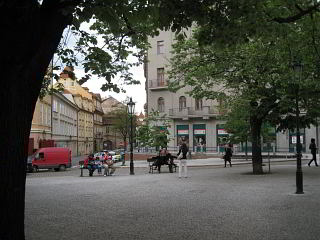
Kozí plácek was where the tinsmith tinsmith Pimpra came from.
Background
Kozí plácek is the unofficial name of a small town square in Staré město, Prague. The streets Kozí ulice, Haštalská ulice, U Obecního dvora and Vězeňská ulice all end here.
Quote(s) from the novel
[III.4] Ale to byl asi nějakej vomyl. Klempíře Pimpra z Kozího plácku taky vždycky hledali, když šel kupovat plech do města, a našli ho také vždycky v podobnej místnosti, buď u ,Šuhů’, nebo u ,Dvořáků’, jako já vás našel.
 | Bolzanova ulice |  | |||
| |||||
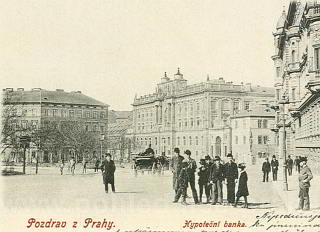
Bolzanova ulice is mentioned in the story Švejk tells Leutnant Dub about the construction site foreman from Vršovice who didn't want to drink anything that contained alcohol.
Background
Bolzanova ulice is the name of a short street in Praha II.. It is located near the main railway station.
Quote(s) from the novel
[III.4] Za tuhle dobrou zprávu dal starej Vejvoda celou láhev vermutu na stůl a potom se voba vypravili do Bolzánový ulice, co se tam jde dolů po schodech a co tam mají gramofon.
Also written:Bolzánova uliceHašek
 | Malý Polanec |  | ||||
| ||||||
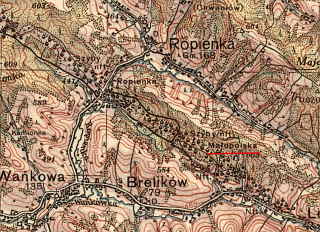
Malý Polanec is mentioned when the brigade is ordered to continue onwards from Tyrawa Wołoska towards Malý Polanec and Liskowiec. There is no explicit description of any stay there.
Background
Malý Polanec seems to have been a place between Tyrawa Wołoska and Liskowiec but it can't be identified. Jaroslav Šerák suggests that it might be Malopołska by Brelików, which judging by the author's description of the route is plausible. That said it rather looks like the name of a hill rather than a village.
Quote(s) from the novel
[III.4] Nadporučík Lukáš zavolal telefonistu Chodounského, účetního šikovatele Vaňka a kurýra kumpanie Švejka a Balouna. Rozkazy byly jednoduché. Všichni nechají výzbroj u sanity, vyrazí ihned na Malý Polanec polní cestou a potom podél potoka dolů jihovýchodním směrem na Liskowiec.
 | Ropa |  | |||
| |||||
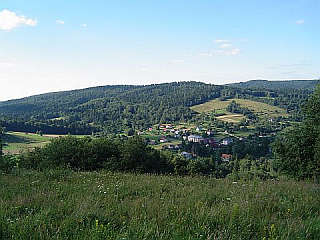
Ropa is just mentioned as the dogs around Liskowiec start to bark.
Background
Ropa is a small river which originates in the Beskyds and flows northwards. Ropa is far from Liskowate so the author is probably getting it mixed up with another place. The source of the name is surely the nearby village of Ropienka and the "potok" (stream) of the same name which flows through the village.
Quote(s) from the novel
[III.4] Psi štěkali čím dál tím více, a dokonce i na jihu za řekou Ropou, rozštěkali se i v Krotience a v několika jiných vesnicích, neboť Švejk řval do nočního ticha: „Lehneš - lehneš - lehneš,“ jako kdysi řvával na své psy, když ještě s nimi obchodoval. Psi se rozštěkali ještě víc, takže účetní šikovatel Vaněk řekl Švejkovi: „Neřvete na ně, Švejku, nebo nám rozštěkáte celou Halič.“
 | Táborsko |  | |||
| |||||
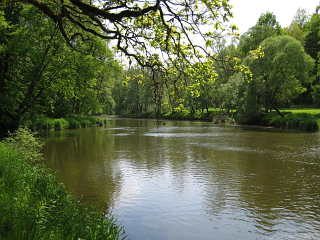
Lužnice
Táborsko is part of Švejk's anecdote about the barking dogs which he tells before they get to Liskowiec.
Background
Táborsko is the Czech name of the Tábor-region in South Bohemia. The region has slightly above 100,000 inhabitants and has eight towns, with Tábor as capital. The river Lužnice flows through most of Táborsko.
Quote(s) from the novel
[III.4] Všude je vokolí pěkně zalidněný, takže ten psí štěkot šel od vesnice k vesnici, pořád dál a dál, a ti psi v naší vesnici, kde jsme lágrovali, když už umlkli, zas uslyšeli z dálky štěkot, třebas odněkud až od Pelhřimova, tak se dali zas do štěkotu, a za chvíli vám štěkalo Táborsko, Pelhřimovsko, Budějovicko, Humpolecko, Třeboňsko a Jihlavsko.
Literature
- Průvodce okolím Tábora, ,1932
 | Pelhřimovsko |  | |||
| |||||
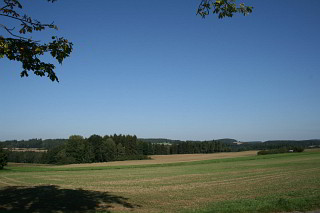
Landscape between Pelhřimov and Humpolec
Pelhřimovsko is part of Švejk's anecdote about the barking dogs.
Background
Pelhřimovsko (okres Pelhřimov) is a region in Vysočina, named after Pelhřimov, the largest town. The other major towns are Humpolec and Pacov.
Quote(s) from the novel
[III.4] Všude je vokolí pěkně zalidněný, takže ten psí štěkot šel od vesnice k vesnici, pořád dál a dál, a ti psi v naší vesnici, kde jsme lágrovali, když už umlkli, zas uslyšeli z dálky štěkot, třebas odněkud až od Pelhřimova, tak se dali zas do štěkotu, a za chvíli vám štěkalo Táborsko, Pelhřimovsko, Budějovicko, Humpolecko, Třeboňsko a Jihlavsko.
 | Humpolecko |  | |||
| |||||
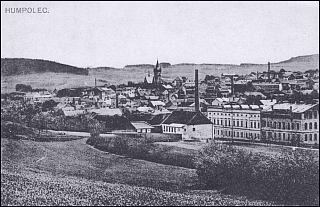
Humpolec in 1918
Humpolecko is part of Švejk's anecdote about the barking dogs.
Background
Humpolecko is the area around Humpolec in the Vysočina region. It is not an administrative unit, see Pelhřimovsko. Humpolec is located only 11 km from Lipnice and is surely a place that Hašek knew about.
Quote(s) from the novel
[III.4] Všude je vokolí pěkně zalidněný, takže ten psí štěkot šel od vesnice k vesnici, pořád dál a dál, a ti psi v naší vesnici, kde jsme lágrovali, když už umlkli, zas uslyšeli z dálky štěkot, třebas odněkud až od Pelhřimova, tak se dali zas do štěkotu, a za chvíli vám štěkalo Táborsko, Pelhřimovsko, Budějovicko, Humpolecko, Třeboňsko a Jihlavsko.
Literature
- Jaroslav Hašek na Vysočině, ,2014
 | Třeboňsko |  | |||
| |||||
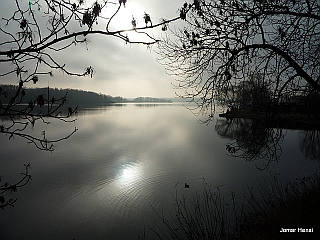
Třeboňsko is part of Švejk's anecdote about the barking dogs. See Táborsko.
Background
Třeboňsko is the area around Třeboň in South Bohemia. The area is flat and known for it's many fish-ponds (rybníky).
Quote(s) from the novel
[III.4] Všude je vokolí pěkně zalidněný, takže ten psí štěkot šel od vesnice k vesnici, pořád dál a dál, a ti psi v naší vesnici, kde jsme lágrovali, když už umlkli, zas uslyšeli z dálky štěkot, třebas odněkud až od Pelhřimova, tak se dali zas do štěkotu, a za chvíli vám štěkalo Táborsko, Pelhřimovsko, Budějovicko, Humpolecko, Třeboňsko a Jihlavsko.
 | Jihlavsko |  | |||
| |||||
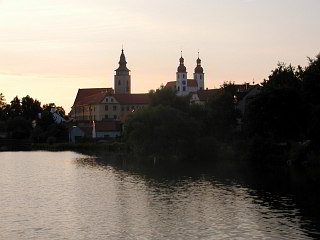
Telč in 2002
Jihlavsko is part of Švejk's anecdote about the barking dogs.
Background
Jihlavsko (okres Jihlava) is the area around Jihlava in the Vysočina region. Jihlava was until 1945 a German-speaking enclave. It is geographically part of Moravia. The number of inhabitants is around 110,000. Telč is another well known town in the region.
Quote(s) from the novel
[III.4] Všude je vokolí pěkně zalidněný, takže ten psí štěkot šel od vesnice k vesnici, pořád dál a dál, a ti psi v naší vesnici, kde jsme lágrovali, když už umlkli, zas uslyšeli z dálky štěkot, třebas odněkud až od Pelhřimova, tak se dali zas do štěkotu, a za chvíli vám štěkalo Táborsko, Pelhřimovsko, Budějovicko, Humpolecko, Třeboňsko a Jihlavsko.
 | Liskowiec |  | ||||
| ||||||
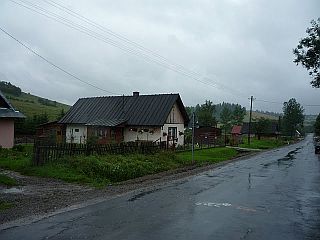
Liskowate in July 2010.
Liskowiec is mentioned 10 times in The Good Soldier Švejk.
Liskowiec saw a visit by the brigade for an overnight stay. It is described how billeting works, both on the account of accommodation and food. The mayor was not very cooperative to start with, Liskowiec was nothing but penury. His attitude changed when Švejk asked him where the nearest tree was. The supply of food was rather meagre: the cow they bought from the Jew Nathan is unforgettably described. Otherwise it's a tale of lice and Švejk's interminable monologues. The men got into the village very late at night, accompanied by barking dogs, and had to leave half past six the morning after. The staff were billeted in the vicarage and the soldiers in a distillery.
Background
Liskowiec probably refers to the village Liskowate in Galicia, now just inside Poland on the border with Ukraine. It belongs to Gmina Ustrzyki Dolne. From 1944 to 1951 it was part of the Soviet Union.
Invented march route
The author's information about the staff being billeted at the Roman-Catholic vicarage does not fit with Słownik geograficzny Królestwa Polskiego i innych krajów słowiańskich. This encyclopaedia only mentions a Greek-Catholic parish, the nearest Roman catholic parish was Jasień. It is also odd that he describes a route along a stream down to the village whereas it is located on the watershed. It can however not be entirely ruled out that Hašek meant Leszczowate, a village in the vicinity.
The geographical aspects of the march from Sanok onwards bears show many traces of being invented. This is natural because Jaroslav Hašek's march battalion didn't follow this route. Mentioned place names are not be found on maps, descriptions of the landscape do not fit, mentioned military units were operating elsewhere at the time. Then there are timing discrepancies. Antoni Kroh (Polish translator of the novel) notes that the battalion/brigade must have marched at a speed of more than 20 km per hour!
Quote(s) from the novel
[III.4] Baloun pomalu zapomínal na představu domnělého nebezpečí a v tichu noci, ještě když sestupovali dolů na Liskowiec, dál neustále vykládal s pohnutím Švejkovi, čeho si dřív nevážil a co by teď jed, až by oči plakaly.
Also written:LiskowiecHašek
Literature
- Po Švejkových (a Haškových) stopách v Haliči, Josef Schwarz,2006
 | Częstochowa |  | |||
| |||||
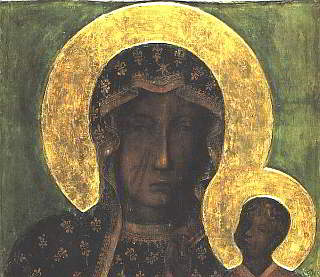
Częstochowa and the Mother of God from there is invoked by the mayor of Liskowiec when he explains how poorly the only cow in the village is.
Background
Częstochowa is a city in Southern Poland, known as a pilgrim destination due to the Black Madonna, a painting in the monastery of Jasna Góra.
Quote(s) from the novel
[III.4] Je to kráva nemocná, tesklivá. Moskali od ní telátko odebrali. Od té doby mléko nedává, ale hospodáři je ji líto zařezat, myslí si, že matka boží čenstochovská opět vše přivede k lepšímu.“
Also written:ČenstochováczTschenstochaudeČenstochovask
Literature
- Słownik geograficzny Królestwa Polskiego..., ,1880 - 1914
 | Grabów |  | |||
| |||||
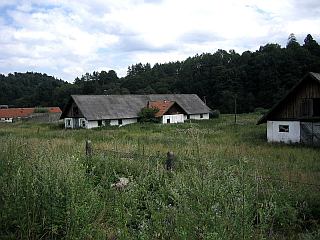
Grąziowa
Grabów is mentioned by the author as a neighbouring village of Liskowiec that has been destroyed. The inhabitants now live in Liskowiec.
Background
Grabów is the name of many places in Poland but none of them are near Liskowate. It may also have been a village in Ukraine, now called Hrabiv or possibly Hrabovo. Although these exists, none of them are near Liskowate.
1) A possible explanation is that Grabów is a mis-spelling of Grąziowa, a village just north of Liskowate. Today there are only a few houses, but in 1915 it had more than 1000 inhabitants.
2) A perhaps better guess is Grabownica (now Грабівниця) just inside Ukraine, north of Dobromil. This is a place the author is much more likely to have known than Grąziowa, and the fact that it is mentioned in the same sentence as neighbouring Chyrów is a further indication.
Quote(s) from the novel
[III.4] Neutrpěla sice požáry, obě válčící strany jako zázrakem nevzaly ji do sféry válečných operací, zato však bylo zde usídleno obyvatelstvo nedalekých zničených vesnic z Chyrówa, z Grabówa a z Holubly.
 | Hołubla |  | |||
| |||||
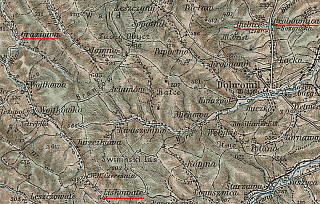
Hołubla is mentioned by the author as a neighbouring village of Liskowiec that has been destroyed. The inhabitants now live in Liskowiec.
Background
Hołubla has not yet been identified. A place with this name does exist in Central Poland but it is out of question that this is the one the author had in mind. It is more likely to be a place in Ukraine and a possible explanation is Hubice (now Губичі), just north of Dobromil.
Quote(s) from the novel
[III.4] Neutrpěla sice požáry, obě válčící strany jako zázrakem nevzaly ji do sféry válečných operací, zato však bylo zde usídleno obyvatelstvo nedalekých zničených vesnic z Chyrówa, z Grabówa a z Holubly.
 | Baikal |  | |||
| |||||
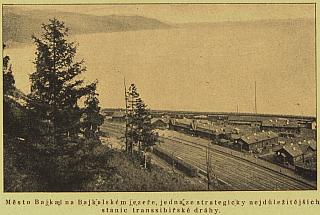
, 12.7.1918
Baikal is mentioned in passing through as several bristly cossacks from beyond Baikal had stayed with the stingy catholic priest in Liskowiec.
Background
Baikal is the largest fresh-water reserve on earth and the deepest lake. Lake Baikal is situated in sourthern Siberia in Russia, not far from the border with Mongolia.
Jaroslav Hašek knew the area from his time as member of the city soviet in Irkutsk in 1920.
Quote(s) from the novel
[III.4] Byl odchován svým otcem ve velké nenávisti proti Rusům, kterouž nenávist však najednou ztratil, když Rusové ustoupili a přišla rakouská vojska, kteráž mu sežrala všechny husy a slepice, které mu Rusové nechali na pokoji, a bydlelo u něho několik ježatých zabajkalských kozáků.
Also written:BajkalczBaikaldeБайкалru
 | Wołoczyska |  | |||
| |||||
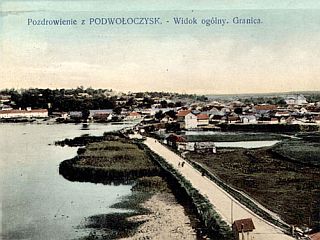
Postcard from 1910, view from the Austrian side.
Wołoczyska is mentioned by the Jew Nathan when he relates about his wonderful cow, which there is no equivalent to all the way to Wołoczyska.
Background
Wołoczyska (Volochysk) is the Polish name of contemporary Волочиськ (Volochysk) in Ukraine. Until 1918 the border between Austria-Hungary and Russia divided the town, with the larger part on the Russian side east of the river Zbruch., whilst the lesser part Podwołoczyska was Austrian.
During the retreat from Tarnopol from 19 July 1917 onwards, Jaroslav Hašek's 1st Czechoslovak Rifle Regiment stayed in Podwołoczyska from 2nd to 6th August. This was the last time the author ever set foot on Austrian territory.
Quote(s) from the novel
[III.4] Chtěl za ni horentní sumu, trhal si vousy a přísahal, že takovou krávu nenajdou v celé Haliči, v celém Rakousku a Německu, v celé Evropě a na celém světě, přitom vyl, plakal a dušoval se, že je to nejtlustší kráva, která kdy z poručení Jehovy přišla na svět. Zaklínal se všemi praotci, že na tu krávu se jezdí dívat až od Woločisky, že se o té krávě mluví v celém kraji jako o pohádce, že to ani kráva není, že to je nejšťavnatější buvol.
Credit: Vaněk/Holeček/Medek: Za svobodu, díl II, s.78-82
Also written:VolochyskenWoločiskaHašekWolotschyskdeВолочиськuk
Literature
- Słownik geograficzny Królestwa Polskiego..., ,1880 - 1914
- History of Volochysk,
 | Královská 18 |  | |||
| |||||
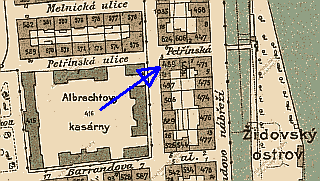
Královská 18 was the home address of Leutnant Dub. He mentions it because he thinks his final hour has arrived.
Background
Královská 18 was a street address in Smíchov, now Zborovská 489/52.
The street got its current name from battle of Zborów in Ukraine (now Zboriv) where on 2 July 1917, the Czechoslovak Brigade for the first time fought k.u.k. Wehrmacht. See also České legie.
Quote(s) from the novel
[III.4] „Jsem unaven,“ řekl tragickým hlasem, „jsem churav a nemocen, prosím, aby se přede mnou nemluvilo o vylomených zubech. Moje adresa je: Smíchov,Královská 18. Nedočkám-li se jitra, prosím, aby má rodina byla o všem šetrně zpravena a aby nebylo opomenuto poznamenati na mém hrobě, že jsem byl též před válkou c. k. gymnasiálním profesorem.“
 | Mikulášská třída |  | |||
| |||||
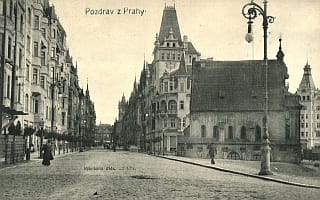

,21.4.1901
Mikulášská třída was the street where Mr. Kraus, the former boyfriend of the detective's wife Chodounská, hailed from.
Background
Mikulášská třída was until 1926 the name of Pařížská ulice in Staré město. Today it counts as the most fashionable street in Prague. The new street appeared as a result of the renovation of Josefov (the Jewish quarter) around the turn of the century and is named after Kostel sv. Mikuláše (at the time Russian Orthodox) that is located at the southern end at Staroměstské náměstí. It was given its name after a decision in the city council on 2 April 1901.
Quote(s) from the novel
[III.4] Já bych Ti to ani nepsal, ale Ty víš sama dobře, že jsi se mně svěřila, že já nejsem první, který s Tebou měl vážnou známost, a že Tě přede mnou měl už pan Kraus z Mikulášské třídy.
Also written:Niklasstrassede
Literature
 | Sedlčansko |  | |||
| |||||
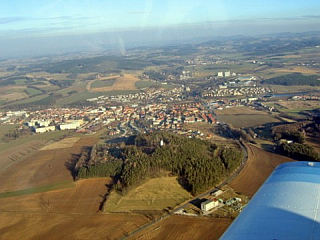
Sedlčansko is mentioned in an anecdote Švejk tells Oberleutnant Lukáš in Liskowiec, on the senior lieutenant's initiative this time. It is about the widow of a postmaster from Sedlčansko and is related to talk about field post offices. The obrlajtnant is not impressed by the story.
Background
Sedlčansko (Sedlčany district) is the area around the town of Sedlčany about 50 km south of Prague east of Vltava. It is a rural area without large cities. It is not an administrative unit.
Quote(s) from the novel
[III.4] Já znám zatím jenom moc krátkou historii vo jedný paní poštmistrový ze Sedlčanska, která po smrti svýho muže dostala tu počtu.
Also written:Sedlčany districtenSeltschanReiner
 | Horní Stodůlky |  | |||
| |||||
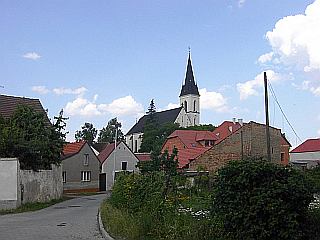
Horní Stodůlky is mentioned in the story of the priest Zanmastil from here who wrote a book about bed-bugs.
Background
Horní Stodůlky is now an area of western Prague, a separate administrative entity until 1974. There is no reference to any Horní Stodůlky, only Stodůlky ("horní" means "upper"). It belong to Prague 13.
Quote(s) from the novel
[III.4] „To dělají štěnice, pane obrlajtnant. To už je stará pověra, že faráři rodějí štěnice. Nikde nenajdete tolik štěnic jako na farách. Na faře v Horních Stodůlkách farář Zamastil napsal dokonce vo štěnicích celou knížku, voni po něm lezly i při kázání.“
Also written:Oberstadelnde
 | Krościenko |  | ||||
| ||||||
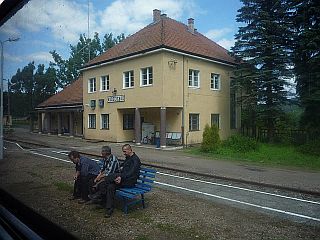
Krościenko sees a visit by the brigade early in the morning after they left Liskowiec. There is no description of any stay here.
Background
Krościenko is a village in Galicia, now just inside Poland on the border with Ukraine. It is located only a few kilometers from Liskowate and is the last railway station on the Polish side of the border.
Quote(s) from the novel
[III.4] V noci bude se vařit guláš. Noclehy pro mužstvo musí být řádné; vyhýbat se zavšiveným chalupám, aby si mužstvo náležitě odpočinulo, poněvadž kumpanie vystupuje z Liskowiec již o půl sedmé hodině ranní přes Kroscienku na Starasol.
Also written:KroscienkaHašekSiegenthalde
Literature
- Słownik geograficzny Królestwa Polskiego..., ,1880 - 1914
- Po Švejkových (a Haškových) stopách v Haliči, Josef Schwarz,2006
 | Stara Sól |  | ||||
| ||||||
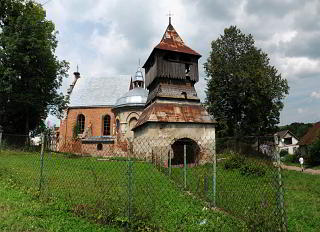
Stara Sól was the destination of the brigade the day Švejk got captured by his own side by Felsztyn.
Background
Stara Sól is the Polish name of the village Старá Сіль (Stara Sil) in Galicia, now just inside Ukraine on the border with Poland. On a military map from 1910 the village is called Starasól.
Quote(s) from the novel
[III.4] V noci bude se vařit guláš. Noclehy pro mužstvo musí být řádné; vyhýbat se zavšiveným chalupám, aby si mužstvo náležitě odpočinulo, poněvadž kumpanie vystupuje z Liskowiec již o půl sedmé hodině ranní přes Kroscienku na Starasol.
Also written:StarasolHašekСтара Сільua
Literature
- Słownik geograficzny Królestwa Polskiego..., ,1880 - 1914
 | Sambor |  | ||||
| ||||||
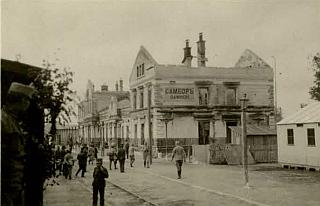
Sambor railway station
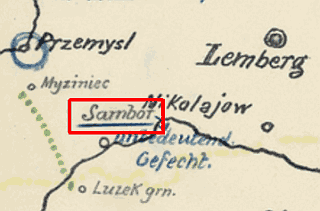
K.u.k. Armeeoberkommando, 18.9.1914

K.u.k. Armeeoberkommando, 16.5.1915
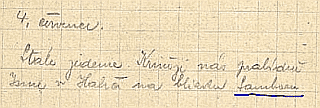
Jan Vaněk, 4.7.1915
Sambor was the destination of the brigade the day Švejk got lost. However, there were counter-orders during they march, so Rechnungsfeldwebel Vaněk and Švejk went to look for quarters in Felsztyn instead ...
Background
Sambor is the Polish name of the city of Самбір (Sambir) in Galicia, now in Ukraine, near the Polish border. Sambor is located in the Lviv oblast and has around 35,000 inhabitants (2010). The city is connected by railway to Lviv and Khyriv.
Sambor was occupied by the Russian army from 17 September 1914 to 15 May 1915. The front was close to the town also during October and the railway station was one of the buildings that suffered serious damage.
IR91/MB12
Jaroslav Hašek's XII. Marschbataillon arrived here by train on 4 July 1915 (or the next day) after a five day journey from Királyhida. From Sambor they continued on foot the next day and joined the operative part of Infanterieregiment Nr. 91 on 11 July. Several of the models for characters in The Good Soldier Švejk arrived at the front with this march battalion: Franz Wenzel (commander), Rudolf Lukas, Jan Vaněk and Hans Bigler.
Ludwig Ganghofer
In his book "Die Front im Osten", Ludwig Ganghofer briefly describes a meeting with Austrian staff officers in Sambor a few days before Przemyśl fell on 3 June 1915.
Die Front im Osten, Ludwig Ganghofer, 5.6.1915
Die Enttäuschung, mit der wir Sambor einfahren, wird hurtig wieder zu himmelhohem Jauchzen. Im Kreis der österreichischen Stabsoffiziere, die uns mit freundlicher Gastlichkeit aufnehmen, sehen wir die Kriegslage des Abends auf der Karte eingezeichnet. Welch! ein erquickendes Ornament!
Quote(s) from the novel
[III.4] Když vyrazili ráno z Liskowiec na Starasol, Sambor, vezli s sebou v polní kuchyni nešťastnou krávu, která se ještě neuvařila. Bylo usneseno, že ji budou vařit po cestě a sní se, až bude odpočinek na půl cestě z Liskowiec na Starasol.
Credit: Jan Morávek, Jan Vaněk, Bohumil Vlček, VÚA, ÖStA, Jaroslav Šerák, Ludwig Ganghofer
Also written:СамбoрruСамбірua
Literature
- Słownik geograficzny Królestwa Polskiego..., ,1880 - 1914
- Sambor zdjęcia, pocztówki, historia miasta Sambor,
- Wino na Kresach – Sambor,
- Dojmy z karpatské a haličské války, Emanuel Vopička,9.1935
- Bilance válečného tažení hejtmana Alserbacha, Jaroslav Hašek,7.8.1916J
 | Arabia |  | |||
| |||||
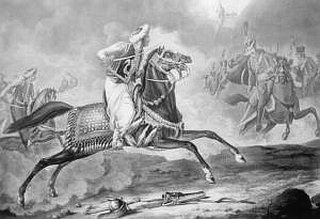
Arabia is mentioned indirectly by Švejk through the Arabian stud Oberleutnant Buchánek bought.
Background
Arabia normally refers to the Arabian Peninsula but here the talk is about the horse breed.
Quote(s) from the novel
[III.4] Taky mu to dlouho nevydrželo, takže musel sáhnout k třetímu budoucímu tchánovi vo kauci. Z tý třetí kauce si koupil koně, arabskýho hřebce, nečistokrevnýho...“
 | Alps |  | |||
| |||||
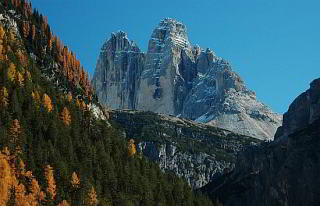
Drei Zinnen (Tre Cime di Lavaredo) in the Dolomites
Alps is mentioned by Švejk in the long anecdote about Oberleutnant Buchánek.
Background
Alps is the next highest mountain range in Europe after the Caucasus. It extends across parts of France, Switzerland, Germany, Austria, Italy, Liechtenstein, Monaco and Slovenia. The highest mountain is Mont Blanc with 4810 metres.
During World War I there was fighing in the Alps on the Italian front in Tirol, the area was otherwise spared destruction. A large part of the Alps was within the borders of Austria-Hungary.
Quote(s) from the novel
[III.4] ,To je hrozný,’ povídá na to nebožtík pan obrlajtnant Buchánek, ,ty si, chlape mizerná, loudíš vo facku, buď rád, že ti dám jenom vobyčejnou pozemskou facku, kdybych ti dal takovou tu měsíční, tak bys při své lehkosti letěl až někam na Alpy a rozplác by ses vo ně.
Also written:AlpyczAlpendeAlpesfrAlpiitAlpesl
 | Resslova ulice |  | |||
| |||||
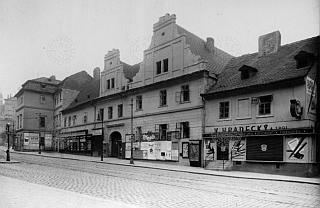
Resslova ulice, 1938
Resslova ulice was the street where an editor dressed in police uniform arrested an innocent elderly couple who were on their way home from a banquet. This is in the anecdote about nadstrážník Hubička.
Background
Resslova ulice is a street in Nové město stretching from Karlovo náměstí down towards Vltava. Jaroslav Hašek attended Obchodní akademie here from 1899 to 1902 and graduated with good marks. See Obchodní akademie.
Quote(s) from the novel
[III.4] Ten jednou vopil toho pana nadstrážníka Hubičku a proměnili si šaty v kuchyni, takže nadstrážník byl v civilu a z pana redaktora stal se policejní nadstrážník, jenom si ještě zakryl číslo revolveru a vydal se do Prahy na patrolu. V Resslový ulici, za bejvalou Svatováclavskou trestnicí, potkal v nočním tichu staršího pána v cylindru a v kožichu, kterej šel zavěšen se starší paní v kožešinovém plášti.
Literature
 | Posen |  | |||
| |||||
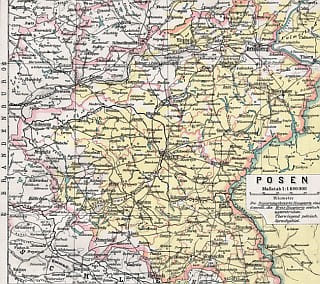
Provinz Posen
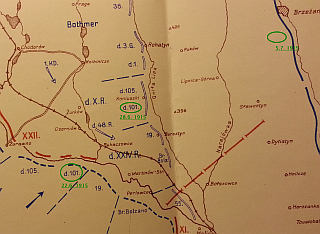
The German 101. Infanteriedivision in the weeks prior to Hašek's arrival at the front.
Posen (now Poznań) is mentioned because two Posen-regiments are to be billeted in Sambor and Wojalycze. Therefore the route of Švejk's march battalion had to be redirected towards Felsztyn.
Background
Posen is the German name of Poznań, one of the oldest and biggest cities in Poland. From 1793 to 1918 it was part of Prussia, and hence from 1871 part of Germany. The city and the province had, even during this period, a Polish majority. In the context of the novel the reference is to two regiments, thus the province of Posen is the subject, not the city itself.
Posen regiments
There were four infantry regiments recruited from the Posen province in the Imperial German Army - numbered 18, 19, 58 and 59. Two of those regiments (18th and 59th) were from 8 May 1915 part of 101. Infanteriedivision, a unit in the German Süd-Armee. The newly formed division was transferred to Stryj and from 20 June 1915 they took part in the offensive from Dniestr to Złota Lipa which they had reached by 5 July. Three weeks later they were fighting by Ostrów further north so they may have crossed path with Jaroslav Hašek's XII. Marschbataillon, a unit that arrived in Sambor on 4 July and had reached the area by Złota Lipa by 11 July.
Whatever regiments Hašek referred to: those from the 101st division could not have been in Sambor when he was there. So either the meeting took place further east or the author had some other German regiments in mind.
Although Hašek probably referred to infantry regiments they may obviously also have been cavalry or artillery units.
Quote(s) from the novel
[III.4] Od brigády přicválal na koni kurýr s novým rozkazem pro 11. kumpanii, že maršrúta se mění na Felštýn, Woralyče a Sambor nechat stranou, neboť tam není možno ubytovat kumpanii, poněvadž jsou tam dva poznaňské pluky.
Credit: GenWiki, Österreich-Ungarns letzter Krieg
Also written:PoznaňczPoznańpl
Literature
- Słownik geograficzny Królestwa Polskiego..., ,1880 - 1914
- Швейк. Исследование. Два познанских полка в Самборе.,
- Infanterie-Regiment von Grolman (1. Posensches) Nr.18,
- Infanterie-Regiment von Courbière (2. Posensches) Nr. 19,
- 3. Posensches Infanterie-Regiment Nr.58,
- Infanterie-Regiment Freiherr Hiller von Gaertringen (4. Posensches) Nr. 59,
 | Woralyče |  | ||||
| ||||||
Woralyče is just about mentioned because two Posen-regiments are to be billetted in Sambor and Woralyče. Therefore the route of the march batallion of IR. 91 had to be redirected towards Felsztyn.
Background
Woralyče (and Wojalycze) are almost certainly misspellings of Wojutycze.
Quote(s) from the novel
[IV.3] Od brigády přicválal na koni kurýr s novým rozkazem pro 11. kumpanii, že maršrúta se mění na Felštýn, Woralyče a Sambor nechat stranou, neboť tam není možno ubytovat kumpanii, poněvadž jsou tam dva poznaňské pluky.
Also written:WojalyczeplВоютичіua
 | Rozdělov |  | |||
| |||||
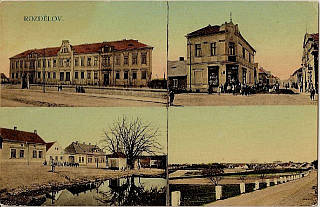
Rozdělov is mentioned in the anecdote about uzenář Křenek.
Background
Rozdělov was a village by Kladno, now a suburb of the city. In the 1950's large housing estate were built here and Rozdělov is now dominated by high-rise apartment blocks.
Quote(s) from the novel
[III.4] „Jednou šel uzenář Křenek z Vinohrad podle plánu města Prahy od ,Montágů’ na Malé Straně domů v noci na Vinohrady a dostal se až k ránu do Rozdělova u Kladna, kde ho našli celýho zkřehlýho k ránu v žitě, kam upad únavou.
 | Karlínský viadukt |  | |||
| |||||
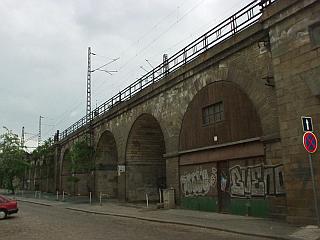
Karlínský viadukt is mentioned in an anecdote Švejk starts in Liskowiec before Oberleutnant Lukáš interrupts him.
Background
Karlínský viadukt is an often used name of Negrelleho viaduct, a railway viaduct in Prague. It starts at Masarykovo station, goes through Karlín and continues across Vltava to Holešovice. It is the oldest railway bridge in Prague. Ferdinandová kasárna, where Feldkurat Katz had his office, was located just across the street from the viaduct, in Karlín.
Quote(s) from the novel
[III.4] „Poslušně hlásím, pane obrlajtnant, že se vynasnažím. Měl jsem sice vošklivej sen, když jsem si trochu k ránu zdříml. Zdálo se mně vo neckách, který tekly přes celou noc na chodbě v domě, kde jsem bydlel, až vytekly a promočily strop u pana domácího, kterej mně hned ráno dal vejpověď. Von byl už, pane obrlajtnant, takovej případ ve skutečnosti; v Karlíně, za viaduktem...“
Credit: Zdeněk Dušek
 | Felsztyn |  | ||||
| ||||||
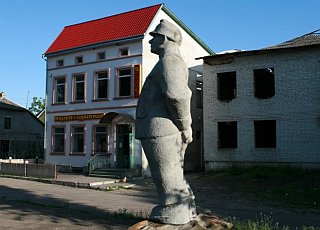
Skelivka, 2010
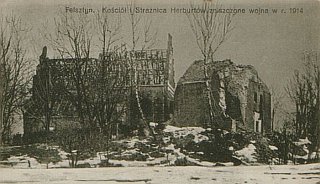
Felsztyn, pocztowka, miasto po inwazji rosyjskiej, 1914
Felsztyn is mentioned 15 times in The Good Soldier Švejk.
Felsztyn witnessed Švejk's greatest feat in the novel: getting captured by his own side after having tried on a Russian uniform by a pond near the village.
Background
Felsztyn is the Polish name of a village in the Lviv oblast in Ukraine, from 1945 renamed Скелівка (Skelivka). The village is located between Sambir and Khyriv, very close to the border with Poland. Skelivka is the smallest place in the world with a statue of Švejk.
The village was in Austrian times part of Galicia and speakers of Polish were in an overwhelming majority. Jews made up more than half the population. The town had a Roman-Catholic church, a Greek-Catholic church and a synagogue. It was heavily damaged during fighting in October 1914 and was on Russian hands until around 15 May 1915. After World War I Felsztyn became part of Poland, and from 1939 the Soviet Union.
Quote(s) from the novel
[III.4] Zde spal Josef Švejk z Prahy, kompanieordonanc 11. marškumpačky 91. regimentu, který jako kvartýrmachr upadl omylem do rakouského zajetí pod Felštýn.
Also written:FelštýnHašekСкелівкаua
Literature
- Słownik geograficzny Królestwa Polskiego..., ,1880 - 1914
 | Chyrów |  | ||||
| ||||||
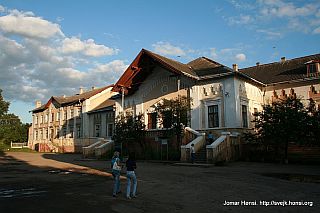
Khyriv railway station, 2010.
Chyrów is mentioned 5 times in The Good Soldier Švejk.
Chyrów was the place Švejk was first taken to after he was captured by Hungarian military police. According to the interrogation report quoted in the novel this must have happened on 16 June 1915. At Chyrów he joined a transport of Russian prisoners of war who were repairing the railway line to Przemyśl.
Background
Chyrów is the Polish name of the town Хирів (Khyriv) in the Lviv oblast in western Ukraine. The town is a railway junction and even in 2010 there were passenger services to Sanok and Lviv (amongst others). The town was part of Austria-Hungary until 1918.
Quote(s) from the novel
[III.4] Byli to Maďaři a Švejka přes jeho protesty odtáhli na etapu v Chyrówě, kde ho zařadili do transportu ruských zajatců určených pracovat na opravě železniční trati směrem ku Přemyšlu.
Also written:Хирівua
Literature
- Słownik geograficzny Królestwa Polskiego..., ,1880 - 1914
- Z Uher do okupovaného ruského Polska, Jan Fried,28.1.1916
- Słownik geograficzny Królestwa Polskiego..., ,1880 - 1914



|
III. The famous thrashing |
 | |
4. Forward March! | |||
| © 2008 - 2024 Jomar Hønsi | Last updated: 20.11.2024 |


